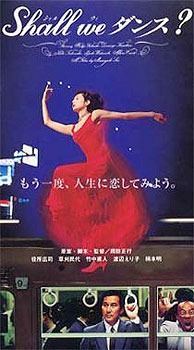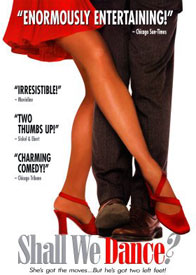 The first time I saw Shall We Dance? (Shall We Dansu? 1995) was at the Seattle International Film Festival. Even in the context of being overwhelmed with way too many films back to back day after day, this stood out as a gem.
The first time I saw Shall We Dance? (Shall We Dansu? 1995) was at the Seattle International Film Festival. Even in the context of being overwhelmed with way too many films back to back day after day, this stood out as a gem.
And when one considers how big a fan I am of horror films & action, & how little I like romantic comedies, for this one to rise from the mass of films as a fantastic experience is all the more surprising even to me.
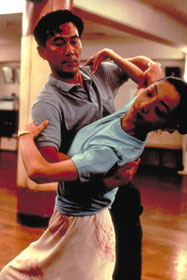 Koji Yakusho is our leading man, one of Japan's great actors, star of Memoirs of a Geisha (2005), Dopperungenga (2003), Pulse (2001), Charisma (1999), The Eel (1997), Cure (1997), Kamikaze Taxi (1995) & many superior performances. Koji Yakusho is our leading man, one of Japan's great actors, star of Memoirs of a Geisha (2005), Dopperungenga (2003), Pulse (2001), Charisma (1999), The Eel (1997), Cure (1997), Kamikaze Taxi (1995) & many superior performances.
In Shall We Dansu he plays everyman Shoehei, a "salary man" dissatisfied with his "successful" work-a-day life, until he discovers ballroom dancing & begins a secret life of dance lessons.
He has a little shame for it, so keeps his new hobby from his wife (Hideko Hara). The whole notion of paying for dance lessons is stigmatized in Japan, as though it were closer to the sex trade than to art.
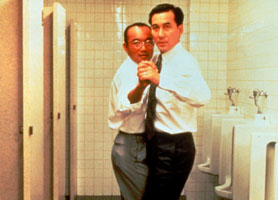 This secrecy is bound to lead to family fear of infidelity, & his wife for some while becomes deeply worried that formerly gloomy Shoehei has become inexplicably happy. This secrecy is bound to lead to family fear of infidelity, & his wife for some while becomes deeply worried that formerly gloomy Shoehei has become inexplicably happy.
But no one could be more innocent than this sweet man who discovers a real talent within himself, striving to personify elegance with his dance partner Mai in an otherwise innocent partnership, their only shared commitment to the dance.
(Mai is played by Tamiyo Kusakari of the Maki Asami Ballet Company. During the filming of Shall We Dansu? Suo Masayuki fell in love & married.)
To describe that plot & a man's rise from misery to happiness through ballroom dance, it might not sound thrilling enough to be exciting even for those of us who usually go for brutal films. Yet this quest for joy in a sad world is truly universal. It is the quest made manifest in a simple thing.
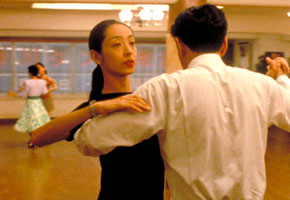 Plus there is definitely something samurai about Shoehei's commitment to the dance. Whether you're out to be Japan's number one swordsman, or Japan's number one ballroom dancer, it's heroic. Plus there is definitely something samurai about Shoehei's commitment to the dance. Whether you're out to be Japan's number one swordsman, or Japan's number one ballroom dancer, it's heroic.
Underneath the skin of many an action film fan is a Romantic who finds romantic films intolerable only because they're so effing awful. When they're actually works of genius, I'm a complete sap for 'em.
The level of acting, the charm of the entire cast, the rise from gloomy dissatisfaction to pride of achievement, the film was truly magical.
Someone in Hollywood thought so, too, & so purchased the script for Hollywoodization. And a film for which every character was a joy to observe became tonally a different film in which only two characters matter, if them.
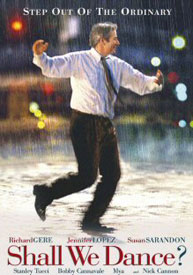 And now we are about to learn why action fans don't go for sappy romances. Everything that was subtle, sincere, & heroic in the Japanese original becomes phony & assinine with Richard Gere & Jennifer Lopez at center stage.
And now we are about to learn why action fans don't go for sappy romances. Everything that was subtle, sincere, & heroic in the Japanese original becomes phony & assinine with Richard Gere & Jennifer Lopez at center stage.
Where Koji Yakusho created a sweet man of considerable awkwardness becoming graceful, whose every scene commands attention whether he's just sitting at his office desk or taking is first dance lesson, Richard Gere just seems to be someone artifically cool from the start temporarily pretending he can't yet dance & whose major character trait is perfect hair.
One of the great films of international consequence is reduced to pablum. It's hard to pinpoint where it all went awry because it is the same story, more or less, but the original Japanese setting for western jazz age dance styles had a greater elegance & an endearing naivete, sweetness in the best sense. In the western setting it's just such a commonplace.
Given the reality test, ballroom dance contests in America are generally rip-off businesses with lonely people paying for the privilege of being held, then conned into paying for very steeply for their instructor's vacations while travelling to sundry cities for "contests."
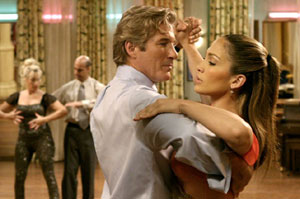 It's really a gigolo or lady-companion industry. Like s/m dungeons it's the sex trade without having to deliver the sex. It's really a gigolo or lady-companion industry. Like s/m dungeons it's the sex trade without having to deliver the sex.
And most of us perfectly understand that anyone legitimately interested in swing dance will study dance more broadly in an art college, not the phony contest circuit.
The artifice of the Hollywoodized pretence that it's anything else never works for a thinking viewer. And the ability to enjoy the alleged romance is dependent on liking the two main players without regard for the quality of the material or the performance.
For me, Richard Gere approaches the repulsive as an actor & Jennifer Lopez merely can't act. They never rise above the mediocre, & they make the whole situation seem saccharine when not sleezy, & never authentic.
I have no interest in ballroom dance per se. The Japanese film made it seem rivetting & exciting, & I could understand why it was important to these characters. The Hollywoodized remake merely reminded me why I have no interest in the topic.
Possibly if I'd not seen the Japanese version first I would've found the remake pleasant enough if forgettable; but the transcendent charm of the original just wasn't ever in the cards for Gere & Lopez's shallow brand of commercialism.
copyright © by Paghat the Ratgirl
|
